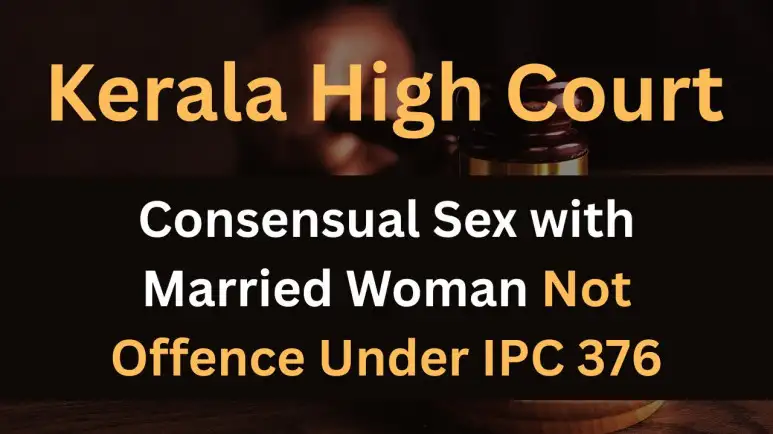Kerala HC Quashes Rape Case: Consensual Sex with Married Woman Not Offence Under IPC 376

The Kerala High Court, under the bench of Hon’ble Justice M.R. Anitha, has quashed a criminal case registered in Kasaragod, stating that the sexual relationship between the petitioner and the defacto complainant was consensual. The court observed that the allegations made under Sections 366, 376, and 506(1) of the Indian Penal Code (IPC) did not constitute an offence.
The petitioner, Babu, a 27-year-old man from Alakkod, Korom, Kannur District, approached the High Court through Cr.M.C. No. 3377 of 2021, seeking to quash the final report (Annexure-A4) in Crime No. 165/2019 of Kasaragod Police Station.
Background of the Case
The case arose from allegations that Babu met the defacto complainant via Facebook, while she was living separately from her husband. According to the complaint:
- On 2 March 2019, Babu allegedly took her on his bike from Neeleswaram to Kasaragod, to a lodge at Anakkuur.
- He reportedly booked Room No. 205 and had sexual intercourse with her multiple times between 12:00 PM and 4:30 PM.
- The complaint claimed that Babu’s actions amounted to offences under Sections 366 (kidnapping), 376 (rape), and 506(1) (criminal intimidation) IPC.
The defacto complainant argued that the petitioner had promised to marry her, which formed the basis for the alleged misconception of fact.
Petitioner’s Argument
Represented by Adv. T.V. Jayakumar Namboodiri, the petitioner argued:
- Even assuming the allegations were true, no offence under Section 376 IPC (rape) was made out.
- The complainant was already a married woman with a child. The relationship was consensual.
- Any promise of marriage by the petitioner had no legal effect, as she was still legally married and could not solemnise another marriage under Section 5(i) of the Hindu Marriage Act, 1955.
- Precedents such as Maheshwar Tigga v. State of Jharkhand (2020 SCC 108) and Santhosh v. State of Kerala (2020 KHC 898) were cited, establishing that consent voluntarily given is not vitiated by promises of marriage when no force is applied.
Public Prosecutor’s Stand
The Public Prosecutor argued that:
- The complainant was living separately from her husband.
- The petitioner’s alleged promise to marry her could amount to misconception of fact, potentially attracting Section 90 IPC, which could affect consent.
High Court Observations
After detailed examination of the FIR, complaint, final report, and affidavits, Justice M.R. Anitha observed:
- Existing Marriage Matters: The defacto complainant was already married and had a child. Any promise of marriage by the petitioner was legally ineffective.
- Consent Was Clear: Evidence suggested that the sexual relationship was voluntary, including the complainant’s own affidavit stating consent.
- No Force or Threat: There was no indication that the petitioner used force, threat, or intimidation, removing the essential elements of Sections 366, 376, and 506(1) IPC.
- Misconception of Fact Not Established: Even if the petitioner promised marriage, it did not amount to misleading the complainant under law, as consent was voluntarily given.
- Judicial Resources: Continuing the case would amount to wastage of judicial and investigative resources, constituting abuse of the process of law.
The court relied on earlier judgments including Jose Thettayil v. SHO, Aluva East Police Station [2013 (3) KHC 336], which emphasised that voluntary participation removes the foundation for a rape claim.
Final Ruling
Based on the findings, the Kerala High Court:
- Allowed the quash petition filed by Babu.
- Quashed the final report (Annexure-A4) of Crime No. 165/2019 of Kasaragod Police Station.
- Declared that continuing criminal proceedings against the petitioner would be an abuse of process of law.
Justice M.R. Anitha’s order clearly establishes that consensual sexual relationships, even involving promises of marriage, do not attract Section 375 IPC when consent is voluntarily given.